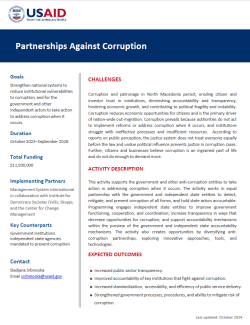CHALLENGES
Corruption and patronage in North Macedonia persist, eroding citizen and investor trust in institutions, diminishing accountability and transparency, hindering economic growth, and contributing to political fragility and instability. Corruption reduces economic opportunities for citizens and is the primary driver of nation-wide out-migration. Corruption prevails because authorities do not act to implement reforms or address corruption when it occurs, and institutions struggle with ineffective processes and insufficient resources. According to reports on public perception, the justice system does not treat everyone equally before the law and undue political influence prevents justice in corruption cases. Further, citizens and businesses believe corruption is an ingrained part of life and do not do enough to demand more.
ACTIVITY DESCRIPTION
This activity supports the government and other anti-corruption entities to take action in addressing corruption when it occurs. The activity works in equal partnership with the government and independent state entities to detect, mitigate, and prevent corruption of all forms, and hold state actors accountable. Programming engages independent state entities to improve government functioning, cooperation, and coordination; increase transparency in ways that decrease opportunities for corruption; and support accountability mechanisms within the purview of the government and independent state accountability mechanisms. The activity also creates opportunities by diversifying anticorruption partnerships, exploring innovative approaches, tools, and technologies.
EXPECTED RESULTS AND IMPACT
●Increased public sector transparency.
●Improved accountability of key institutions that fight against corruption.
●Increased standardization, accessibility, and efficiency of public service delivery.
●Strengthened government processes, procedures, and ability to mitigate risk of corruption.

